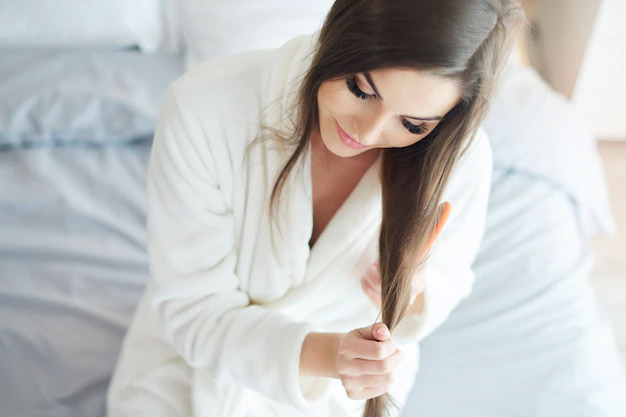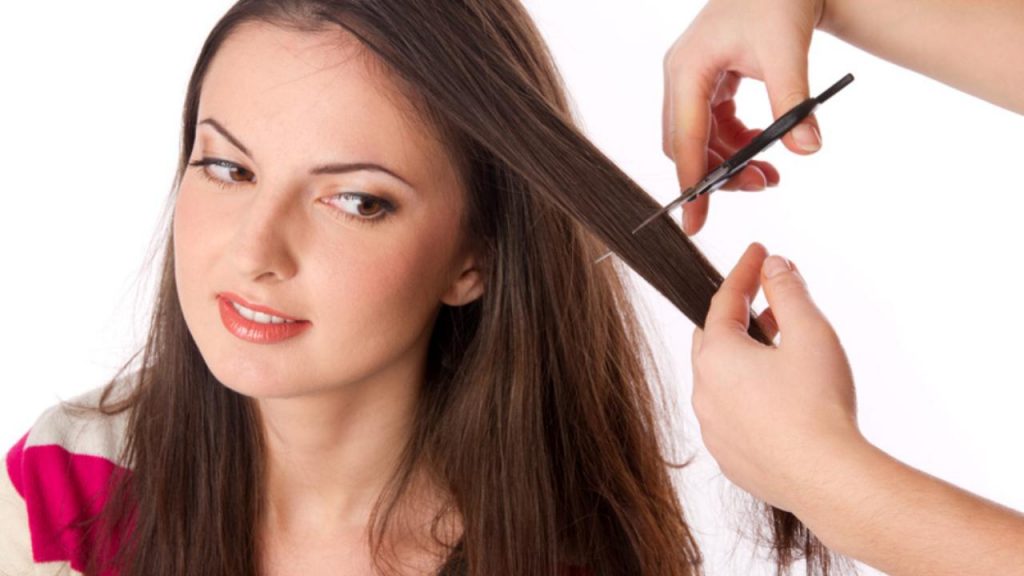Overview
There was once a patient who was losing a lot of hair. His mother got worried and sent him a concoction to apply on his head. It contained henna leaves mixed with tea leaves, curd, egg white, beetroot, amla, shikakai, coconut oil and nilgiri oil. He diligently applied the oily concoction on his head for many years. But he continued to lose hair and eventually suffered total baldness. In spite of doing so much for his hair, he wondered why?
The importance of the right hair care cannot be better emphasized. More than advising the right hair care, it has become important to steer people away from the wrong hair care which is also referred in American Academy of Dermatology Association. The points below should help you understand hair care better.
Keep Hair Care Simple, Do Not Obsess Over It
Many a times hair is the most abused part of the body. This results due to some popular misconceptions about hair care, like…
Myth 1 – “Hair needs nourishment and so it must be oiled everyday”
Hair does need nourishment, but just like any other part of the body, it obtains its nourishment through the food that is consumed and not through the food that is applied on it. It is difficult for a lot of people to acknowledge their balding status as according to them they have followed good hair care i.e. they have regularly applied oil to their hair since childhood.
It is important to understand that oil does nothing more than moisturizing and conditioning your hair. It does not arrest hair loss, does not nourish your hair, does not make it grow long or thick or broad, does not prevent graying of hair and most importantly does not reach the hair roots to perform any magic attributed to it.

Myth 2 – “Hair is dry and something urgently needs to be done to remove the dryness”
Hair is supposed to be dry. It is a dead structure that has no blood vessels or nerves. This is why it does not bleed or hurt when it is cut. On the other hand the scalp has enough oil secretion of its own. So while hair feels dry in the cold weather and application of oil to the hair-ends can help control the frizziness.
However people with dry hair are often obsessed with it and opt for special treatments like deep conditioning, serum treatments, hot towel treatments, hair smoothening treatments and so on. This is where a line needs to be drawn. No matter what you do the nature of hair cannot be changed and trying to force your hair to not be dry may actually lead to hair loss.

Myth 3 – “Make curly hair straight or straight hair curly”
People with naturally straight hair want it curly and people with curly hair want straight hair. The grass is always green on the other side! And there are salon people to reinforce this. Also once you have permed or straightened your hair, you need to use a special shampoo and conditioner to maintain it. And the shampoo and the conditioner happen to be available only at the salon.
You don’t have to be an expert to know that you are abusing your hair. People who obsess over hair care are often the ones that suffer hair damage and start losing hair at a younger age. Dry hair or curly hair is any day better than having no hair. Sometimes the best thing you can do to your hair is leave it alone.
In most cases if you keep your scalp clean, cut your hair at regular intervals and ensure that you are eating well; it is enough to control hair loss.

Maintain the Right Hygiene for Hair and scalp
There is nothing like a standard scalp and hair regime that is right for everyone. The regime depends on your hair type, scalp type, the climate and the activities that you are involved in. For example, the regime for a person who spends most of the time in a controlled air conditioned atmosphere is different as compared to a person who is exposed to dust, pollution or is prone to excessive sweating. The guidelines below should help you follow the right hygiene under varying situations.
Maintaining The Length of the Hair Can Help To Have Control Over Hair Loss
There is a direct correlation between the length of hair and hair loss. Maintaining a certain length of hair in proportion to the strength of hair roots helps in controlling hair loss better. When a person is losing hair, the roots are often weak and the longer the hair the more is the pressure on the weak roots. Furthermore as washing long hair is a task, people with long hair tend to compromise on the hygiene by shampooing only once or twice a week.
Most Indian women love to maintain long hair. In normal circumstances there is no problem. But if you are losing hair, then you need to reconsider. As even from the beauty point of view, it makes no sense to have long hair at the back of your head and bald patches on the top of your head or an unhygienic scalp full of infection.

Don’t fall prey to free advice
More traumatic than the actual suffering is the free advice from people who seem to know it all. And because it is free, people usually fall for it. For example, the most common advice given is –
False Advice 1
“You Are Losing Hair; Your Shampoo Must Be Very Strong. Use A Mild Shampoo”
Sure, but how does one know which shampoo is mild. Most people are not aware of even the basic ingredients that go into making a shampoo; forget about the ingredients that go into making a “mild” shampoo. This then leads to the person who knows it all to suggest what he or she thinks is a “mild shampoo” and this goes on till your hair is really messed up.
False Advice 2
“Get Rid Of Split Ends, Mix 1 Tbs Of Honey, 1 Tsp Of Olive Oil, 1 Egg Yolk, 1 Diced Tomato, 1 Grated Carrot & 3 Tbs Of Hung Yogurt. Then Apply This On Your Hair Daily”
A better suggestion would be to put the above mixture in the bin and GO GET A HAIR CUT!
Choose Products as per your hair & scalp type
“Protein enriched volumising shampoo with deep cleansing action”, sounds very promising! And not only does it give you great looking hair, but a happy married life, obedient children and a high paying job too! Unfortunately real life is far from that. It is futile to expect too much out of your hair products
There is nothing more a shampoo can do other than clean the scalp. It does not go down to your hair roots to rejuvenate them or nourish them. No shampoo can strengthen hair, stop hair loss or nurture your hair with proteins and vitamins. Similarly a conditioner can only soften hair, allowing detangling and easy combing of hair.
So how does one choose the right shampoo?

Shampooing correctly keeps the scalp clean and prevents scalp infections. Choosing the shampoo depends on the nature of your hair and your scalp type. For example a person with straight hair, oily scalp and sticky dandruff should shampoo daily and use shampoos that lather on the higher side and contain a combination of SLES compounds and Zinc Pyrithione. A person with curly hair, dry scalp and dry dandruff may shampoo on alternate days and use shampoos with a high conditioning base with Zinc Pyrithione and ALES compounds. A person with straight to curly hair with average scalp sebum and no dandruff may shampoo on alternate days and use shampoos meant for normal to dry hair, containing in-built conditioners preferably without Zinc Pyrithione.
Knowing your scalp type
A blotting paper test can help you understand your scalp type. Skip shampooing for 2 days in a row, press a piece of blotting paper against the scalp for about 20 seconds. Remove the paper and assess the size of the wet patch on the blotting paper. If the size is negligible, the scalp is dry. If the size is bigger, almost the size of a finger tip or even bigger then it suggests an oily scalp. Generally people who sweat profusely also tend to have an oily scalp. Once the scalp type is known, following the correct hair care becomes easy.
Eating right
What is the best diet for hair? This is a commonly asked question.
Unfortunately there is no simple answer to this. Hair is made up of protein. So a high protein diet should ideally help. But that’s not true; in fact it is just the opposite. Protein supplements like whey protein are known to aggravate hair loss. The next common supplement is iron, but most men have more than enough iron content and yet they go bald. Could it then be a deficiency of Zinc or Folic acid or Vitamin D or Vitamin B12…the list goes on.
Largely there is no standard food formula for hair. Most standard diets like quaffing a fistful of soaked almonds every morning will only make you fatter, while you continue to lose more hair.

Food for good hair can only be suggested on the basis of two parameters – one is on the basis of deficiency and second on the basis of a particular food having specific healing power.
Deficiencies are identified through blood tests. When it comes to hair, the deficiencies are usually of iron, vitamin or protein. Iron deficiency is mostly seen in women. However blindly supplementing with iron is ineffective, as iron deficiencies are often due to poor absorption of iron, rather than less intake. Protein deficiency is more common in people who are on weight loss programs or those who indulge in heavy exercises.
Apart from deficiencies some foods have certain healing properties which can help in controlling hair loss. These are typically organic food items which contain elements like inositol, choline. They are prescribed in varying combinations depending on the severity of the condition.
Drink sufficient water
The human body has a natural mechanism where any shortfall of water is compensated first from the hair and skin. Even with mild dehydration, circulation to the base of the outer skin, where the hair roots are located, shut down as a measure to prevent losing water through evaporation from the skin surface. Thus the hair gets dehydrated and damaged much before the person develops appreciable levels of thirst.
It is normal for people who exercise regularly or are involved in outdoor activities to require more water. Surprisingly people who are indoors are also prone to hair dehydration. This happens because of excess consumption of caffeinated drinks like tea, coffee and various colas. Caffeinated drinks actually force the water out of the body creating even a greater need for water consumption. So a person can be indoors all day, drink 4 cups of coffee or tea and be as dehydrated as if outdoors.







